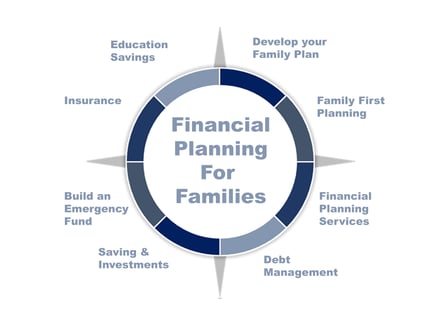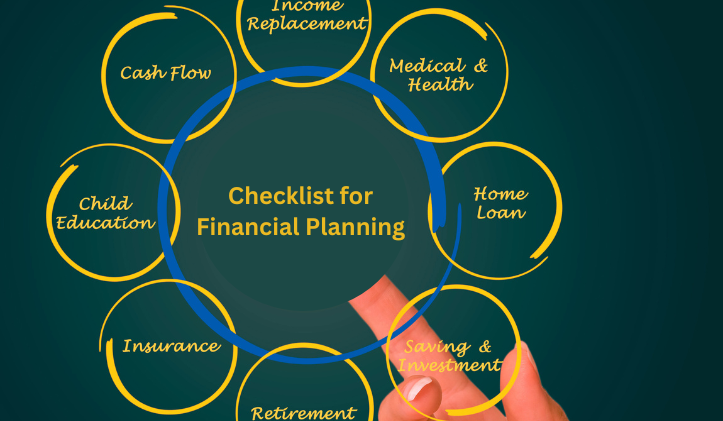Financial Planning for Families

You’ve probably heard the saying “Those who fail to plan, plan to fail.”
Financial Planning for Families is an important topic for every family. It doesn't matter how large your family is or how old. With all of life’s twists and turns, it's important to have a solid plan in place to make sure your family's financial future is safe.
In this blog, we'll look at the most important items of family financial planning. We'll look at:
- Monthly financial planning,
- Starting a family financial planning, and
- Whether or not a financial planning service is worthwhile.
- Different steps that you need to take to ensure your family’s financial security
We’ll finish up by covering some specific things you might want to do or might want to think about.
Financial Planning for Families
To start your Financial planning for families you need to start with a clear understanding of your current financial situation. Gathering up all the information you have about your income, expenses, debts, and assets. Then think about your future goals in terms of both amounts and time. This “Big Picture” exercise will be the start of your planning.
Family First Financial Planning: A Necessity, Not an Option
We like to think of the best strategy as "Family First Financial Planning." That means that when deciding between different financial options, you place your family's well-being and financial security above all else. It’s about making choices and decisions that safeguard your family’s future, and that means that you will be prepared no matter what happens.
Financial Planning Services for Family
Most people use a DIY approach to financial planning. They reason that they don’t make enough money to justify paying someone else to advise them, or they just don’t like others knowing about their financial details. In reality, professional guidance can be well worth the cost. Financial planners aren’t there to judge. They are there to offer you a direction forward.
You work with them to define your future goals, and they work with you, within your constraints, to figure out how to achieve those goals. Their expert insight and tailored strategies can help you achieve your family's financial goals. When working with financial planning services for families, it's essential to establish open communication. Your financial advisor should understand your family's values, priorities, and long-term vision. With this knowledge, they can develop a personalized financial plan that safeguards your family's financial future.
Monthly Financial Planning: A Foundation for Success
After you’ve set up some long-term goals, your monthly financial planning leads you toward a monthly budget. This budget is the cornerstone of your family's financial strategy. You will create a detailed budget, track expenses, and set financial goals on a month-to-month basis. A journey of a thousand miles is accomplished step by step. By focusing on monthly financial planning, you gain better control over your finances and you can make adjustments as needed to achieve your long-term objectives. This isn’t as difficult as it may sound.
You can use tools like Quicken or other online tools to see exactly where your money went. Many banks offer reports of your spending habits for free! If you are like most people, you have at one time or another said “I don’t know where all the money went!” Most people are surprised when they track their money and see where it is going. You think you’re being frugal until you look at a report and realize that you spent $600 on restaurants last month!
Starting a Family Financial Planning
Many people start to think about financial planning when they start planning for a family. There is nothing like the first baby to drastically change a family’s financial balance. In many young couples, both people work. They are called “DINK’s”: Dual-Income, No Kids. When that first baby arrives, they suddenly lose half of their income and simultaneously double their expenses.
We joking saying they become “SIK”: Single-Income, Kids. It can feel overwhelming at first, but it doesn't have to be. By setting specific, measurable, achievable, relevant, and time-bound (SMART) financial goals, life doesn’t have to change that much and you will feel more secure knowing that your finances are supporting you both now and in the future. Time is on your side. Small actions now can make a huge difference in the future. Whether saving for your children's education, buying a home, or building an emergency fund, having clear objectives in mind will guide your financial decisions.

All of this is great to think about, but what does that mean for you in terms of what you should do today, tomorrow, and ongoing? Financial planning for families encompasses a wide range of strategies and tactics, so here are some key areas to consider:
- Emergency Fund: Building an emergency fund is crucial. It provides a financial safety net in case unexpected expenses or emergencies arise, and they always do. How big should your emergency fund be? Some experts say you should have at least 6 month’s worth of salary saved up.
Debt Management: Developing a plan to pay off high-interest debts can free up more money for savings and investments. Few things eat up a budget faster without adding to your quality of life than paying monthly interest payments. The faster you can get rid of consumer debt (credit cards) the better you and your family will be.
Savings and Investments: Explore various savings and investment options to grow your wealth over time. The good news is that your emergency fund qualifies as savings! Start putting it away and then start investing to help it grow faster.
Insurance: Life happens. Adequate insurance coverage, including life insurance and health insurance, protects your family from financial hardships in challenging times. How much insurance should you have? It is different for everyone, but one thing is absolute: you will need to update/change your insurance plan when your family changes.
Retirement Planning: It comes faster than you think. Plan for your retirement to ensure you have a comfortable and secure future. The next time you get a raise, continue to live on the same amount you did before and put the raise into investments. You’ll be surprised how much difference that makes! - Education Savings: If you have children, consider setting up education savings accounts to fund their higher education. Many people get 529 plans for their kids, but that may not be the best idea. You are locked into specific education channels and it can be difficult to get the money back out. Without a doubt, you should save for education, but you should explore your options.
- Estate Planning: Estate planning isn’t just for the ultra-rich. If you own a home, a car, a savings account, a 401K, or anything else of value, basic estate planning ensures that your assets are distributed according to your wishes, providing peace of mind for your family's future. Of course, Ironclad Family offers you free planning guides.
- Achieving Financial Freedom: It’s you and your family's journey. You can make it all the more enjoyable and stress-free through just a little planning.
Family financial planning isn’t just an option; it's a necessity. It's about prioritizing your family's well-being, setting clear financial goals, and taking actionable steps to achieve them. Remember that "Financial Planning for Families" should be a recurring theme in your life, guiding your decisions and ensuring a legacy of financial security for generations to come.
Financial planning services for families offer valuable expertise to help you navigate the intricate world of finance. I encourage you to embrace the journey of personal and family financial planning with the confidence that your family's future is in capable hands.
So, what's your excuse for not being ready to embark on your family's financial planning journey?
Contact us today for more information.


